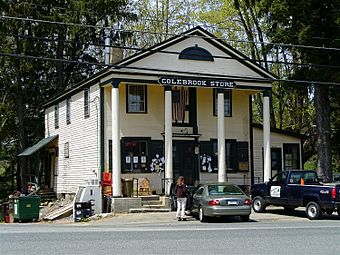Colebrook Store facts for kids
|
Colebrook Store
|
|
|
U.S. Historic district
Contributing property |
|
 |
|
| Location | 559 Colebrook Rd. (CT 183), Colebrook, Connecticut |
|---|---|
| Area | 1 acre (0.40 ha) |
| Built | 1812 |
| Built by | Swift, William |
| Part of | Colebrook Center Historic District (ID91000953) |
| NRHP reference No. | 76001980 |
Quick facts for kids Significant dates |
|
| Added to NRHP | April 26, 1976 |
| Designated CP | July 26, 1991 |
The Colebrook Store is a really old and special building in Colebrook, Connecticut. It's been a local shop, like a general store, since it was built way back in 1812! This building is famous for its unique look, especially its two-story front that looks like a temple. Because it's so important, it was added to the National Register of Historic Places in 1976.
What Makes the Colebrook Store Special?
The Colebrook Store stands out in the quiet village center of Colebrook. You can find it at the corner of Route 183 (Colebrook Road) and Rockwell Road. It's a two-and-a-half story building made of wood. It has a pointed roof and its outside walls are covered with overlapping wooden boards called clapboards.
A Closer Look at Its Design
What makes the store truly unique is its front. It has a special design called a Federal temple front. This means it looks a bit like an ancient Greek temple. It has a triangular top part, called a pediment, supported by four tall, thin columns. In the middle of the triangular top, there's a cool half-round fan shape, which is a classic Federal style detail.
Behind these columns, the front of the building is smooth and even. It has windows on both sides of two doorways. One doorway is on the first floor, and the other is on the second floor. The second-floor door used to be for loading things into the store. Many of the doors, windows, and even some things inside the store were updated in the late 1800s. You can still see old hardwood floors, shiny tin ceilings, and classic counters inside.
Its Long History
The Colebrook Store was built in 1812 by a local carpenter named William Swift. He was known for making bedsteads, which are frames for beds. William Swift traveled a lot, and he used his experiences to create this building with a unique style. It's a special version of the Adam style of Federal architecture. He also helped build the Solomon Rockwell House in Winsted.
For a long time, the store has been a very important part of the Colebrook community. People in the 1800s often used it as a landmark when describing the area. Today, the Colebrook Store still serves the community and visitors as a general store, just like it has for over 200 years!
 | Toni Morrison |
 | Barack Obama |
 | Martin Luther King Jr. |
 | Ralph Bunche |



